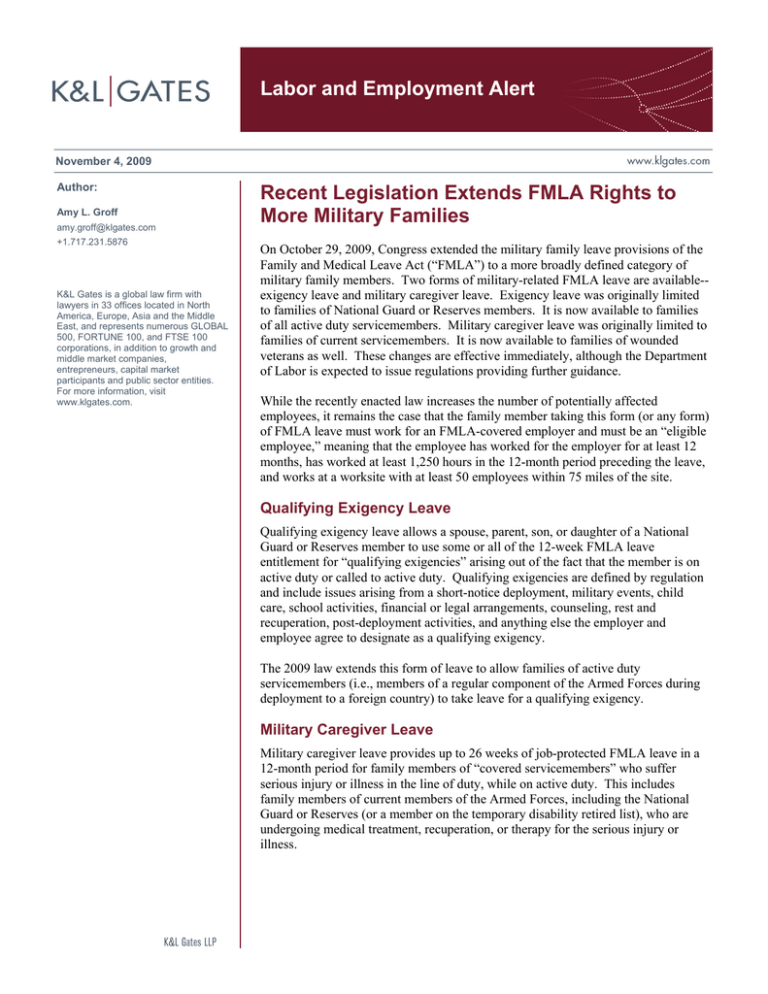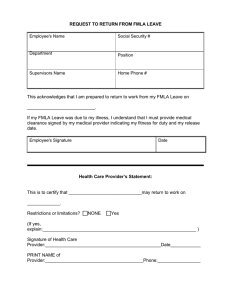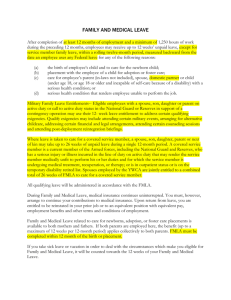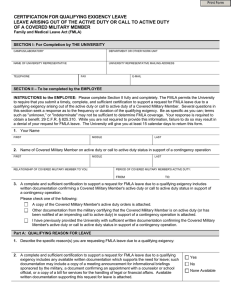
Labor and Employment Alert
November 4, 2009
Author:
Amy L. Groff
amy.groff@klgates.com
+1.717.231.5876
K&L Gates is a global law firm with
lawyers in 33 offices located in North
America, Europe, Asia and the Middle
East, and represents numerous GLOBAL
500, FORTUNE 100, and FTSE 100
corporations, in addition to growth and
middle market companies,
entrepreneurs, capital market
participants and public sector entities.
For more information, visit
www.klgates.com.
Recent Legislation Extends FMLA Rights to
More Military Families
On October 29, 2009, Congress extended the military family leave provisions of the
Family and Medical Leave Act (“FMLA”) to a more broadly defined category of
military family members. Two forms of military-related FMLA leave are available-exigency leave and military caregiver leave. Exigency leave was originally limited
to families of National Guard or Reserves members. It is now available to families
of all active duty servicemembers. Military caregiver leave was originally limited to
families of current servicemembers. It is now available to families of wounded
veterans as well. These changes are effective immediately, although the Department
of Labor is expected to issue regulations providing further guidance.
While the recently enacted law increases the number of potentially affected
employees, it remains the case that the family member taking this form (or any form)
of FMLA leave must work for an FMLA-covered employer and must be an “eligible
employee,” meaning that the employee has worked for the employer for at least 12
months, has worked at least 1,250 hours in the 12-month period preceding the leave,
and works at a worksite with at least 50 employees within 75 miles of the site.
Qualifying Exigency Leave
Qualifying exigency leave allows a spouse, parent, son, or daughter of a National
Guard or Reserves member to use some or all of the 12-week FMLA leave
entitlement for “qualifying exigencies” arising out of the fact that the member is on
active duty or called to active duty. Qualifying exigencies are defined by regulation
and include issues arising from a short-notice deployment, military events, child
care, school activities, financial or legal arrangements, counseling, rest and
recuperation, post-deployment activities, and anything else the employer and
employee agree to designate as a qualifying exigency.
The 2009 law extends this form of leave to allow families of active duty
servicemembers (i.e., members of a regular component of the Armed Forces during
deployment to a foreign country) to take leave for a qualifying exigency.
Military Caregiver Leave
Military caregiver leave provides up to 26 weeks of job-protected FMLA leave in a
12-month period for family members of “covered servicemembers” who suffer
serious injury or illness in the line of duty, while on active duty. This includes
family members of current members of the Armed Forces, including the National
Guard or Reserves (or a member on the temporary disability retired list), who are
undergoing medical treatment, recuperation, or therapy for the serious injury or
illness.
Labor and Employment Alert
The 2009 law expands military caregiver leave to
cover family members of wounded veterans.
Specifically, it covers family members of veterans
who (1) are undergoing medical treatment,
recuperation, or therapy for a qualifying serious
injury or illness incurred in the line of duty on active
duty (the new law recognizes for both veterans and
current members of the Armed Forces that a serious
illness or injury can include a preexisting injury or
illness that was aggravated in the line of duty on
active duty) and (2) were members of the Armed
Forces, including the National Guard or Reserves, at
some point during the five-year period before
undergoing the treatment, recuperation, or therapy.
Conclusion
These changes to the FMLA will increase the
number of employees entitled to take job-protected
FMLA leave and will require employers to revise
written policies, procedures, postings, and employee
handbooks. Employers should also provide updated
training to supervisors and human resources staff so
that they handle leave requests appropriately. We
expect the Department of Labor to issue regulations
providing further guidance and will keep our clients
informed as these regulations are finalized.
Anchorage Austin Beijing Berlin Boston Charlotte Chicago Dallas Dubai Fort Worth Frankfurt Harrisburg Hong Kong London
Los Angeles Miami Newark New York Orange County Palo Alto Paris Pittsburgh Portland Raleigh Research Triangle Park
San Diego San Francisco Seattle Shanghai Singapore Spokane/Coeur d’Alene Taipei Washington, D.C.
K&L Gates is a global law firm with lawyers in 33 offices located in North America, Europe, Asia and the Middle East, and represents numerous
GLOBAL 500, FORTUNE 100, and FTSE 100 corporations, in addition to growth and middle market companies, entrepreneurs, capital market
participants and public sector entities. For more information, visit www.klgates.com.
K&L Gates comprises multiple affiliated partnerships: a limited liability partnership with the full name K&L Gates LLP qualified in Delaware and
maintaining offices throughout the United States, in Berlin and Frankfurt, Germany, in Beijing (K&L Gates LLP Beijing Representative Office), in
Dubai, U.A.E., in Shanghai (K&L Gates LLP Shanghai Representative Office), and in Singapore; a limited liability partnership (also named K&L
Gates LLP) incorporated in England and maintaining offices in London and Paris; a Taiwan general partnership (K&L Gates) maintaining an office in
Taipei; and a Hong Kong general partnership (K&L Gates, Solicitors) maintaining an office in Hong Kong. K&L Gates maintains appropriate
registrations in the jurisdictions in which its offices are located. A list of the partners in each entity is available for inspection at any K&L Gates office.
This publication is for informational purposes and does not contain or convey legal advice. The information herein should not be used or relied upon
in regard to any particular facts or circumstances without first consulting a lawyer.
©2009 K&L Gates LLP. All Rights Reserved.
November 4, 2009
2




![(NPD-60) []](http://s3.studylib.net/store/data/007320126_1-47edb89d349f9ff8a65b0041b44e01a8-300x300.png)
